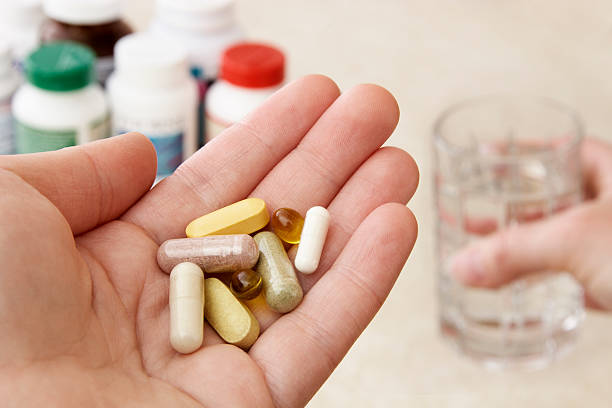Nutrition
Discover How Many Vitamins and Minerals Your Body Needs
You can promote your body’s overall well-being and maybe reduce your risk of some illnesses by supplying it with the proper combination of vitamins and minerals.
Are you curious about how many vitamins and minerals your body requires to function optimally? In this article, we’ll look at the important nutrients your body needs for good health. From vitamin A to zinc, each nutrient is essential for supporting a variety of biological activities, including energy production, immune system maintenance, and bone health.
Understanding the precise vitamins and minerals your body requires can help you make smart dietary selections and potentially avoid nutrient shortages. Some nutrients are required in large quantities (macronutrients), whereas others are required in minute amounts (micronutrients).
However, it is crucial to realize that each person’s nutritional requirements may differ depending on age, gender, activity level, and underlying health issues.

The Role of Vitamins in the Body
Vitamins are chemical substances that are necessary for a variety of biological processes. They play an important role in growth, development, and overall health. The body need 13 key vitamins to function effectively, which include vitamins A, C, D, E, K, and B vitamins.
Vitamin A
Vitamin A promotes eye health, immunological function, and cell growth. It can be found in vegetables like carrots, sweet potatoes, and spinach. Vitamin C is a potent antioxidant that promotes immunological function, collagen formation, and wound healing. Citrus fruits, berries, and bell peppers are excellent sources of vitamin C.
Vitamin D
Vitamin D is unique in that it may be generated by the body in response to sunlight. It’s essential for calcium absorption, bone health, and immunological function. Fatty fish, fortified dairy products, and egg yolks are good dietary sources of vitamin D. Vitamin E is an antioxidant that protects cells from harm. Foods that contain it include nuts, seeds, and vegetable oils.
Vitamin B
The B vitamins, which include B1, B2, B3, B5, B6, B7, B9, and B12, are essential for energy synthesis, red blood cell creation, and brain function. Whole grains, meat, fish, eggs, and leafy greens are all sources of these nutrients.
Essential Minerals for Optimal Health
Minerals are important for good health, along with vitamins. Minerals are inorganic chemicals that are required for a variety of body activities, including nerve transmission, muscular contraction, and bone formation. Your body need various vital minerals, including calcium, magnesium, potassium, iron, and zinc.
Calcium is essential for strong bones, teeth, muscle function, and nerve transmission. Dairy products, leafy greens, and fortified foods are excellent calcium sources. Magnesium plays a role in hundreds of metabolic activities in the body, including muscle and neuron function, as well as energy production. Magnesium-rich foods include nuts, seeds, and whole grains.
Potassium regulates fluid balance, neuron function, and muscle contraction. Potassium-rich foods include bananas, potatoes, and leafy green vegetables. Iron is required for the formation of red blood cells and oxygen transport. It can be found in meals including red meat, chicken, fish, and beans. Zinc supports immunological function, wound healing, and DNA synthesis. Zinc-rich foods include oysters, steak, and pumpkin seeds.

Recommended Daily Intake of Vitamins and Minerals
The recommended daily consumption of vitamins and minerals varies according to age, gender, and life stage. The Recommended Dietary Allowances (RDAs) and Adequate Intakes (AIs) are guidelines produced by health authorities to assist individuals in meeting their nutritional requirements.
For example, the RDA for vitamin C is 75-90 milligrams per day for adults, whereas the AI for calcium is 1000-1300 milligrams per day, depending on age and gender. It is crucial to note that these rules are generic principles, and specific requirements may differ.
Common Vitamin and Mineral Deficiencies
Despite the significance of vitamins and minerals, shortages can occur, resulting in a variety of health issues. Some frequent deficiencies include iron deficiency anemia, which can cause fatigue and weakness, and vitamin D deficiency, which can weaken bones and increase the risk of fractures.
Other deficiencies, such vitamin B12 and calcium insufficiency, might have serious health repercussions. It is critical to recognize the signs and symptoms of deficiencies and seek medical attention if you feel you are lacking in any vitamins or minerals.
Foods Rich in Vitamins and Minerals
Eating a varied and balanced diet rich in vitamins and minerals is one of the greatest methods to guarantee you get enough of them. Your daily diet should include fruits and vegetables, entire grains, lean proteins, and healthy fats.
Citrus fruits, for example, provide a lot of vitamin C, but leafy greens are high in magnesium and vitamin K. Dairy products are high in calcium, whereas nuts and seeds include vitamin E and zinc. By including a range of these items into your meals and snacks, you may help your body meet its nutritional demands.

The significance of a balanced diet in meeting vitamin and mineral requirements
While a balanced diet can provide the majority of the needed vitamins and minerals, it is vital to highlight the word “balance.” Eating a variety of nutrient-dense foods ensures that you receive a diverse range of vitamins and minerals in the proper proportions.
Taking supplements to meet your nutrient demands may not deliver the same health benefits as eating entire meals. Whole foods also contain beneficial substances such as fiber, antioxidants, and phytochemicals, which may offer additional health-promoting properties.
Vitamin and Mineral Supplements: Do You Need Them?
In rare situations, you may need to take supplements to meet your vitamin and mineral requirements. Certain people, such as pregnant women, vegetarians/vegans, and elderly persons, may have higher nutrient requirements or struggle to achieve them solely through diet.
However, before starting any supplements, contact with a healthcare practitioner, as excessive intake of some vitamins and minerals might have negative consequences. They may also interact with prescriptions or other supplements that you are currently using.

Potential Risks of Excessive Vitamin and Mineral Intake
While vitamins and minerals are necessary for optimal health, they can be consumed in excess. Excessive ingestion of some vitamins and minerals can cause toxicity and negative health effects. For example, an overabundance of vitamin A can produce nausea, dizziness, and even liver damage.
High iron levels can be hazardous, causing organ damage, whereas excessive calcium intake might contribute to the production of kidney stones. Follow the prescribed vitamin and mineral dietary guidelines and avoid excessive supplementation unless directed by a healthcare expert.
Conclusion
Finally, recognizing which vitamins and minerals your body need is critical for sustaining good health and well-being. By including a range of nutrient-rich foods in your diet, you can ensure that your body receives the proper balance of vitamins and minerals.
While supplements may be helpful in some cases, they should never replace a healthy diet. Prioritizing a nutrient-dense diet rich in fruits, vegetables, whole grains, lean proteins, and healthy fats is the most effective strategy to achieve your vitamin and mineral requirements while also supporting general health. So, start making conscious nutrition choices today and gain the benefits of a healthy body.
Trusted Health, Wellness, and Medical advice for your well-being



